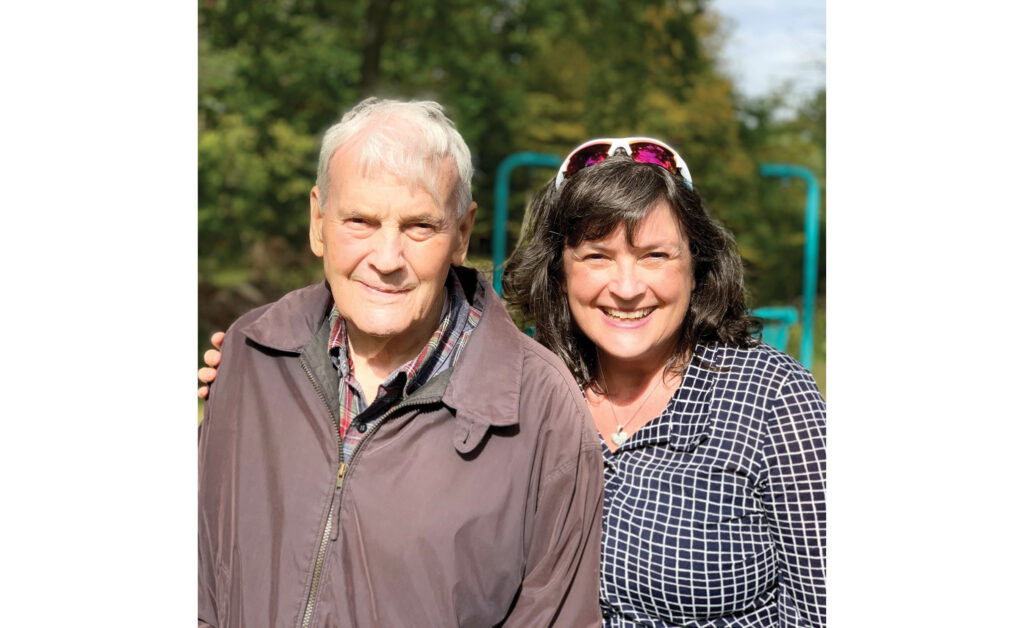Words Connie Dunwoody, Broadmead Care
I remember when my Dad called me to tell me of his diagnosis of Alzheimer’s disease and Lewy Body disease. “A double whammy,” I thought. “He always was an over-achiever.”
I wasn’t sure what would happen next. It reminded me that we don’t choose dementia – it chooses us. My Dad held a PhD from Yale: no slouch, he. But that towering intellect couldn’t protect him from the dual diseases that slowly took away his independence and memory.
Then something unexpected happened. I’d always felt like the “slow kid” at the table, listening to my Dad and brother trade jokes in Latin and Greek. Yet as the disease progressed, I found I could talk with him in new, meaningful ways. We had some truly precious conversations.
So what helps when someone you love is living with dementia? How do we stay connected on this strange and winding road?
Meet Them Where They Are
“Do you see people sitting down in the backyard, with their backs to us?” he asked once. “No, Dad, but it’s OK if you do.” There were no people there. No Bible study in the living room, no children playing on the woodpile, no little ones in his bed. These hallucinations were part of the Lewy Body disease. They were real to him.
Our instinct is often to reason people back to our reality, because their absence, their loss, hits so hard. Their intellect, their memory and their role in our lives all seem to vanish. But telling my Dad he was “just seeing things” wouldn’t have helped. The better option was to enter his reality, to meet him where he was, and reassure him.
Acknowledge and Distract
Dad wasn’t upset by what he saw, just curious. I let him know it was OK, and part of his illness, then gently changed the subject to divert his attention.
“Hey, Dad, I was thinking about the cottage on Amherst Island.” That memory, from decades ago, was safe ground. “I remember when we went sailing and ran aground where the Topsy Farms folks were having a picnic.” He paused, recollecting, then laughed. “And they gave us wine and zucchini bread!”
If he didn’t recall something, I moved on. I avoided “do you remember” questions, because the answer was usually “no,” and I didn’t want to remind him of what he’d lost. It was enough that I remembered.
Don’t Take it Personally
People with dementia can problem solve in ways that don’t make sense to the rest of us. Once, my dad’s wife told him she was too old to keep up with his needs. “Well, then I’ll just get a younger wife,” he replied.
She was hurt. I was amused and a little in awe of the reasoning intellect that was still there. I said: “Don’t take it personally. Non-dementia Dad wouldn’t have said that. He’s just problem-solving the only way he knows how.”
His reasoning skills were still active, just a little sideways. If X doesn’t work, try Y! It wasn’t about her. It was about a brain struggling to find solutions in a world that no longer made sense.
Often, what people say or do isn’t really about us. It could be triggered by discomfort, confusion, or even a memory. We don’t always know everything about our parents: there’s always more going on under the surface.
The Greatest Privilege
There are so many ways to support someone with dementia, and good resources to guide you. I always wanted my Dad back, and in the end, I got him. I mean, I really got him. I understood what he needed. It was my turn to help my Dad, this intellectual giant of a man, who loved me with his whole heart, always. And it was one of the greatest privileges of my life.
Connie Dunwoody is Communications Coordinator for Broadmead Care. The older she gets, the more she cherishes everyday moments and simple pleasures.
Photo Caption Connie with her Dad, Stan, enjoying an everyday moment in the park near his house.





When my Alzheimer’s symptoms began to worsen forgetting names, losing my way, and struggling with everyday tasks I felt overwhelmed and frightened. Traditional medications offered limited help, and I started to believe there was nothing more that could be done. That’s when I discovered NaturePath Herbal Clinic.From the very beginning, their approach felt different. The team took time to listen, understand my symptoms, and tailor a natural herbal therapy specifically for me. Within a few weeks, I began noticing changes my thoughts felt clearer, I had fewer moments of confusion, and even my mood improved. My family noticed the difference too.While Alzheimer’s is still a part of my life, I finally feel like I have a sense of control again. NaturePath didn’t just offer treatment they offered hope, compassion, and genuine care. If you or a loved one is navigating Alzheimer’s, I strongly recommend reaching out to them. It could be the turning point you http://www.naturepathherbalclinic.com